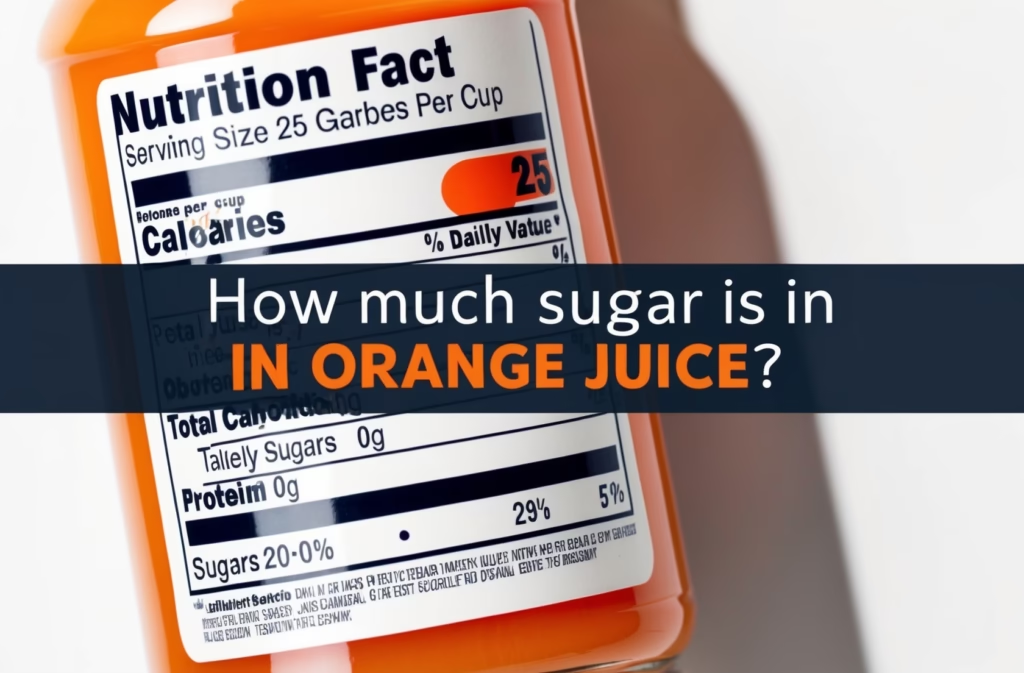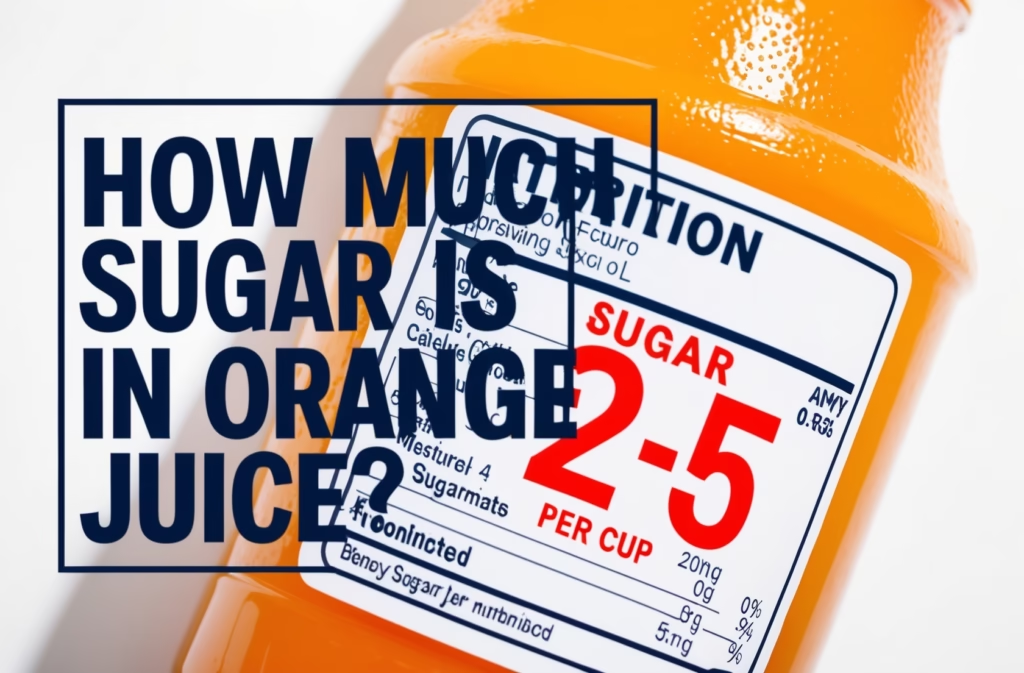How Much Sugar In A Orange Juice? Discover the sugar content of orange juice per serving. Uncover the surprising Sugar Content Orange Juice facts. Find out now!
How Much Sugar In Orange Juice? A Comprehensive Guide to Sugar Content
Orange juice is a popular breakfast beverage, loved for its refreshing taste and perceived health benefits. However, many are unaware of the surprising amount of sugar content orange juice can contain. Understanding the how much sugar in orange juice is crucial for making informed choices about your diet and overall health. This comprehensive guide delves deep into the sugar content of orange juice, exploring various factors influencing it and offering tips for managing your sugar intake.
Understanding Orange Juice Sugar Per Serving
The orange juice sugar per serving varies significantly depending on several factors, including the type of orange juice, the brand, and the serving size. Generally, a single serving (approximately 8 ounces) of commercially produced orange juice can contain anywhere from 18 to 25 grams of sugar. This is significantly higher than the sugar content found in a whole orange. A medium-sized orange typically contains around 12 grams of sugar, distributed naturally within the fruit’s fiber and other nutrients. Processing the juice strips away much of this fiber, resulting in a more concentrated source of sugar.
It’s crucial to check the nutrition label on the specific brand of orange juice you’re consuming. These labels usually list the total sugar content per serving, allowing you to make a more informed decision. Look for options with lower added sugar, as some brands add sugar to enhance the flavor or extend the shelf life. Remember, even 100% orange juice without added sugar contains a substantial amount of naturally occurring sugar.
Factors Affecting Sugar Content in Orange Juice
Several factors contribute to the varying sugar content orange juice brands offer. One primary factor is the type of orange used. Some orange varieties naturally have higher sugar levels than others. The processing method also plays a significant role. Orange juice that is minimally processed retains more of the pulp and fiber, potentially offering a slightly lower glycemic index and impacting the way your body processes the sugar. However, even minimally processed orange juice contains considerable natural sugar.
Adding other fruits, such as in a delicious mango orange juice blend, will naturally increase the overall sugar content. Similarly, combining it with other fruits like pineapple or coconut, as in a pineapple orange coconut juice, or even orange mango pineapple juice, increases the overall sugar content. Comparing this to something like green apple juice, which is naturally lower in sugar, highlights the significant differences across juice types.
The concentration of the juice also matters. Some juices are more concentrated than others, leading to a higher sugar content per serving. For example, frozen concentrate orange juice typically requires adding water, which will dilute the sugar concentration. However, even after dilution, it will usually still contain a significant amount of sugar. Consider the type of packaging too. Some types of packaging might impact the sugar content. This often isn’t a major factor, but the overall storage and handling conditions can contribute to slight variations over time.
Comparing Orange Juice to Other Fruit Juices
While orange juice is a popular choice, it’s important to consider its sugar content in comparison to other fruit juices. Many fruit juices, particularly those from tropical fruits, have similarly high sugar levels. A orange grapefruit juice blend, for instance, might have a slightly lower sugar content than pure orange juice, depending on the proportions. Understanding these differences can help you make better choices concerning your overall sugar intake.
Health Implications of High Sugar Intake from Orange Juice
The high how much sugar in orange juice content raises concerns about its impact on health. Excessive sugar intake is linked to various health issues, including weight gain, type 2 diabetes, heart disease, and tooth decay. While orange juice provides some vitamins and antioxidants, its sugar content can outweigh these benefits if consumed in large quantities. It’s essential to moderate your intake and consider healthier alternatives, such as consuming whole oranges, which offer more fiber and nutrients while providing a lower concentration of sugar.
The American Heart Association recommends limiting added sugars to no more than 25 grams per day for women and 36 grams per day for men. Given that a single serving of orange juice often exceeds this recommendation for added sugars alone, it is wise to limit your consumption or choose lower-sugar alternatives. Furthermore, be aware of the glycemic index (GI) of orange juice. The GI measures how quickly a food raises blood sugar levels. Orange juice has a relatively high GI, meaning it can cause a rapid spike in blood sugar.
Tips for Managing Sugar Intake from Orange Juice
If you enjoy orange juice but are concerned about its sugar content, there are ways to manage your intake. One simple strategy is to dilute your orange juice with water. This reduces the overall sugar concentration per serving. You can also choose to consume orange juice less frequently, perhaps only once or twice a week, instead of daily. Consider switching to other breakfast options that provide similar vitamins and minerals but with a lower sugar content, such as berries, yogurt, or oatmeal.
Read food labels meticulously to compare the sugar content of different brands and varieties. Opt for 100% orange juice without added sugars whenever possible. If you’re making your own juice at home, you can control the sugar content by adding water or combining it with lower-sugar fruits and vegetables.
Alternatives to Orange Juice for a Healthier Sugar Intake
Many delicious and nutritious alternatives to orange juice offer similar vitamins and minerals with less sugar. Consider whole fruits like oranges, grapefruits, and berries, which contain natural sugars but also substantial fiber, slowing down sugar absorption. Vegetable juices, such as carrot or beetroot juice, are lower in sugar and offer a different nutritional profile. Other healthier options include unsweetened tea, water infused with fruits or vegetables, and smoothies made with a base of unsweetened yogurt or milk.
Conclusion: Making Informed Choices about Orange Juice Consumption
Understanding the how much sugar in orange juice is a crucial step in making informed dietary choices. While orange juice offers some nutritional benefits, its high sugar content warrants mindful consumption. By paying attention to serving sizes, choosing brands with lower added sugars, and exploring healthier alternatives, you can enjoy the taste of orange juice without compromising your health. Remember to consult a healthcare professional or registered dietitian for personalized advice on managing your sugar intake.
For more in-depth information on sugar consumption and healthy dietary habits, refer to resources like the National Institute of Diabetes and Digestive and Kidney Diseases and the American Heart Association.
We hope this guide has been helpful. Now we want to hear from you! Share your experiences and tips on managing your orange juice consumption and sugar intake in the comments below. What strategies do you employ to balance your enjoyment of orange juice with your health goals? Let’s discuss!

- Q: How much sugar is in a typical glass of orange juice?
A: The sugar content orange juice varies depending on the brand and size of serving, but a typical 8-ounce glass can contain anywhere from 18 to 25 grams of sugar. This is a significant amount, making it important to be mindful of your intake. - Q: Is there a big difference in sugar content between different brands of orange juice?
A: Yes, there can be noticeable differences. Always check the nutrition label to compare the orange juice sugar per serving between brands. Some brands add extra sugar, while others rely solely on the natural sugars in oranges. - Q: How much sugar is in a 12-ounce glass of orange juice?
A: Expect a 12-ounce serving to have roughly 27-37 grams of sugar, depending on the brand and whether it’s 100% juice. Always check the nutrition facts for precise information on the How Much Sugar In A Orange Juice. - Q: Does freshly squeezed orange juice have less sugar than store-bought?
A: Generally, yes. Freshly squeezed orange juice from whole oranges will naturally have less added sugar compared to commercially produced orange juice which may contain added sugars or concentrates. However, it still contains natural sugars. - Q: Is orange juice high in sugar?
A: Yes, orange juice is relatively high in sugar. While it offers some vitamins, the sugar content orange juice is considerable and should be consumed in moderation as part of a balanced diet. - Q: How does the sugar in orange juice compare to other fruit juices?
A: Orange juice tends to fall in the middle range of sugar content among fruit juices. Some juices, like apple juice, contain even more sugar. Check individual product labels to compare. - Q: What is the recommended daily intake of sugar, and how much of that is in orange juice?
A: The recommended daily added sugar intake varies depending on guidelines, but generally less than 25 grams is advised. A single serving of orange juice can often exceed this, even without added sugar, due to its natural sugar content. Always refer to current dietary recommendations. - Q: How can I reduce my sugar intake from orange juice?
A: Dilute your orange juice with water, consume smaller servings, or choose lower-sugar alternatives like unsweetened orange juice or even better, eat a whole orange. - Q: Does the type of orange affect the sugar content?
A: Yes, different orange varieties have slightly varying sugar levels, but the differences are usually not significant enough to drastically change the overall How Much Sugar In A Orange Juice. - Q: Where can I find the sugar information for orange juice?
A: The orange juice sugar per serving is always listed on the nutrition facts label of the orange juice carton or bottle. Look for the sugars line to see the grams of sugar per serving.

How Much Sugar in Orange Juice? A Comprehensive Guide to Sugar Content
Orange juice is a popular breakfast staple and a refreshing drink enjoyed throughout the day. But how much sugar is actually in that seemingly healthy glass? Understanding the sugar content of orange juice is crucial for making informed choices about your diet. This blog post will delve into the details of orange juice sugar per serving, exploring various factors that influence sugar levels and offering tips for healthier consumption.
Decoding the Sugar Content of Orange Juice
The sugar content orange juice varies significantly depending on several factors: the type of orange, the method of juicing, added sugars, and the serving size. Naturally, freshly squeezed orange juice generally contains less added sugar than commercially produced juices. Many store-bought orange juices contain added sugar to enhance flavor and extend shelf life. Always check the nutrition label carefully to determine the amount of added sugars per serving.
A typical 8-ounce serving of 100% orange juice (no added sugar) contains approximately 20-25 grams of sugar. This sugar is naturally occurring fructose, glucose, and sucrose found within the oranges themselves. However, it’s important to remember that even natural sugars contribute to your overall daily intake.
How Much Sugar in a Glass of Orange Juice? Factors Affecting Sugar Content
Several factors influence the amount of sugar in your orange juice. Let’s explore these in detail:
Type of Orange:
Different orange varieties contain varying amounts of natural sugars. Some oranges are sweeter than others, directly impacting the sugar level in the juice. For instance, Valencia oranges are known for their high sugar content, while some navel oranges might be slightly less sweet.
Juicing Method:
Freshly squeezed orange juice generally has the lowest amount of added sugar. Commercially produced juices, however, often undergo processes that may alter sugar levels. Some brands may add sugar, while others may concentrate the juice, potentially increasing the sugar concentration.
Added Sugars:
Many commercially produced orange juice varieties contain added sugars, such as high-fructose corn syrup or sucrose. These additions significantly increase the overall sugar content of orange juice. Always read the nutrition label carefully to check for added sugars.
Serving Size:
The amount of sugar you consume depends on the serving size. A larger glass of orange juice will naturally contain more sugar than a smaller one. Pay attention to the serving size indicated on the nutrition label.
Orange Juice vs. Other Fruit Juices: Comparing Sugar Content
Let’s compare the sugar content of orange juice to some other popular fruit juices. While all fruit juices contain natural sugars, the levels vary considerably:
For a refreshing alternative, consider trying our Mango Orange Juice recipe, which blends the sweetness of mango with the tang of orange. If you prefer a tart option, our Green Apple Juice is a fantastic choice. For a more citrusy experience, explore our Orange Grapefruit Juice. We also have delicious recipes like Pineapple Orange Coconut Juice and Orange Mango Pineapple Juice which offer exciting flavor combinations.
According to the FDA, understanding the nutritional composition of your drinks is crucial for a balanced diet. The Healthline website offers valuable information on the health impacts of various sugar sources.
Tips for Managing Sugar Intake from Orange Juice
Here are a few tips for enjoying orange juice while managing your sugar intake:
- Choose 100% orange juice with no added sugar.
- Opt for freshly squeezed juice whenever possible.
- Dilute your orange juice with water to reduce the sugar concentration.
- Consume orange juice in moderation as part of a balanced diet.
- Read nutrition labels carefully to compare sugar content between brands.
Nutrition Table: 8-ounce Serving of 100% Orange Juice (No Added Sugar)
This table provides an -estimate- based on average values. Actual nutritional content may vary slightly depending on the type of orange and other factors.
| Nutrient | Amount per Serving | % Daily Value (2,000 calorie diet) |
|---|---|---|
| Calories | 112 | 6% |
| Protein | 2g | 4% |
| Total Fat | 0g | 0% |
| Saturated Fat | 0g | 0% |
| Unsaturated Fat | 0g | 0% |
| Trans Fat | 0g | 0% |
| Total Carbohydrate | 26g | 9% |
| Dietary Fiber | 2g | 8% |
| Total Sugars | 22g | N/A |
| Vitamin C | 90mg | 100% |
| Potassium | 240mg | 7% |
| Calcium | 50mg | 5% |
| Iron | 0.2mg | 1% |
Summary: Key Nutritional Features of Orange Juice
Orange juice is a good source of Vitamin C, a powerful antioxidant essential for immune function. It also contains potassium, which is important for maintaining healthy blood pressure. However, it’s important to be mindful of its natural sugar content and consume it in moderation. Choosing 100% juice with no added sugar and opting for freshly squeezed juice are excellent strategies for healthier consumption.
A final word on this topic is to always consult with your healthcare provider or a registered dietitian to assess your individual nutritional needs and create a personalized dietary plan.
Call to Action
Ready to enjoy a refreshing and nutritious glass of orange juice? Try our recipes and let us know your thoughts! Share your experience on social media using #OrangeJuiceSugarContent #HealthyJuices #OrangeJuiceRecipe. Don’t forget to leave a comment below sharing your favorite ways to enjoy orange juice! Let’s discuss the best ways to incorporate this citrus delight into your diet while being mindful of its sugar content!

How Much Sugar in Orange Juice? Practical Tips and Health Considerations
Orange juice is a popular breakfast beverage, often touted for its vitamin C content. However, the sugar content is a significant consideration for health-conscious individuals. The amount of sugar varies depending on the type of orange juice – whether it’s freshly squeezed, from concentrate, or a blend like a delicious mango orange juice. Even freshly squeezed juice contains natural sugars from the fruit itself. Processed orange juice often contains added sugars, further increasing the overall sugar intake.
A typical 8-ounce serving of commercially produced orange juice can contain anywhere from 18 to 25 grams of sugar, sometimes even more. This is a significant amount, especially considering recommended daily sugar limits. To reduce your sugar intake, consider diluting your orange juice with water. You can also explore alternatives like a refreshing green apple juice, which is naturally lower in sugar.
For those watching their sugar intake, understanding the nutritional information on the label is crucial. Pay close attention to the added sugars section, as this indicates any sugars added during processing. Consider choosing 100% orange juice with no added sugars to minimize your sugar consumption. Alternatively, explore other citrus juice blends that may be lower in sugar, such as orange grapefruit juice.
If you enjoy sweeter juice blends, remember that the sugar content will likely increase. For instance, a tropical blend like pineapple orange coconut juice will naturally contain more sugar due to the addition of pineapple and coconut. Similarly, orange mango pineapple juice will have a higher sugar content compared to plain orange juice. Be mindful of your overall daily sugar intake when consuming these types of blends.
Moderation is key. While orange juice offers some nutritional benefits, consuming excessive amounts can contribute to weight gain and other health problems. Enjoy it in moderation as part of a balanced diet. Remember to always check the nutrition label for accurate sugar content before making a purchase.
Disclaimer: This information is for general knowledge and does not constitute medical advice. Consult a healthcare professional or registered dietitian for personalized dietary advice.